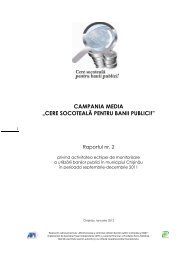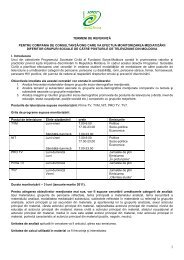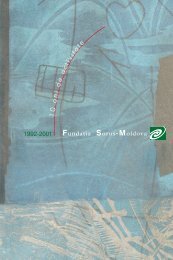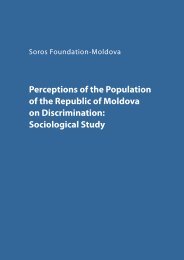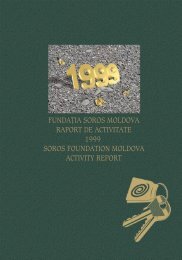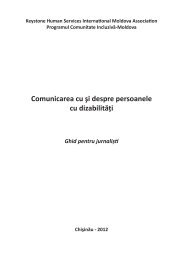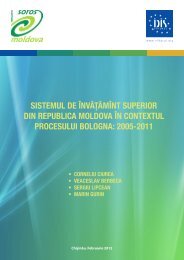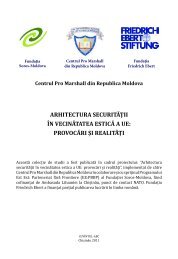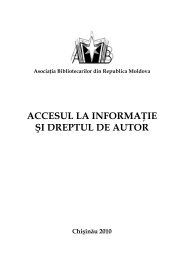Managing Intractable Conflicts: Lessons from Moldova and Cyprus
Managing Intractable Conflicts: Lessons from Moldova and Cyprus
Managing Intractable Conflicts: Lessons from Moldova and Cyprus
Create successful ePaper yourself
Turn your PDF publications into a flip-book with our unique Google optimized e-Paper software.
Nested Identities: From History Books to the Emergence of a Post-Conflict Generation in <strong>Cyprus</strong><br />
27<br />
Nowadays nobody, or very few, would opt for enosis 4 or even taksim, but the<br />
perceptions about each other that were created or strengthened during the years<br />
of that struggle, remain. So, when the Megali Idea (see footnote 2) faded away,<br />
what stayed <strong>and</strong> entered the national culture seemingly irreversibly was the Hellenic<br />
– Orthodox synthesis [induced by the concept of Megali Idea]. This shaped the<br />
paradigms <strong>and</strong> the images through the process of Hellenic [Greek] identity building.<br />
As many other national identities, modern Greek identity used negative images of<br />
the other as one of its building stones. Hellenism was to be the model to identify<br />
with, while the ‘other’ was represented by the late Ottoman Empire, the Republic<br />
of Turkey <strong>and</strong> the heirs of the Ottoman Empire, the Turks (Tiryaki, 2013). Turkish<br />
Cypriots are also sometimes subjected to the popular stereotype in which they are<br />
portrayed as the descendants of converted Greeks (Bryant, 2004).<br />
Education has played a substantial role in this identity building <strong>and</strong> consolidating<br />
process. The fact that education has always been a domain of the respective<br />
communities since the time when the isl<strong>and</strong> became a subject to the British<br />
Administration, has led to each side being taught different <strong>and</strong> opposing accounts<br />
of history. As a result, separate school curricula of Greek Cypriots <strong>and</strong> Turkish<br />
Cypriots have only helped to establish the negative reverse images of each other, as<br />
they were focused primarily on the dehumanization <strong>and</strong> devaluation of the other.<br />
Until the violent inter-communal conflict erupted in 1963, the official schoolbooks<br />
of the respective motherl<strong>and</strong>s, guided by stereotypes, were directly used by both<br />
communities. Since that time, they have been using modified versions of a various<br />
degree.<br />
Thus the Greek Cypriot history books treat the history of <strong>Cyprus</strong> as a part of history<br />
of Greece. Such a history is divided into three periods: Ancient Greece, medieval<br />
Greece [Byzantine Empire] <strong>and</strong> modern Greece [characterized by the creation of<br />
the Greek state in the 19 th <strong>and</strong> 20 th centuries]. Some 300 years of Ottoman Empire<br />
period in <strong>Cyprus</strong> is not mentioned as a part of the <strong>Cyprus</strong> history but as a foreign<br />
domination that destroyed the glorious Byzantine Empire. Modern Greece is<br />
identified with modern <strong>Cyprus</strong> history <strong>and</strong> Hellenism is portrayed as a transcendental,<br />
trans-historical category interwoven in all three periods.<br />
4 Although it must be noted that the Resolution on enosis passed by the Republic of <strong>Cyprus</strong><br />
House of Representatives consisted then already only <strong>from</strong> Greek Cypriots on 26 June 1967 is<br />
still valid.




